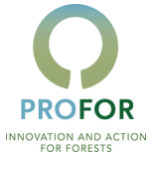In the Congo Basin, there is a need for significant activity at the level of the region and the countries, to recognize the current challenges in the management of the basin and the opportunities going ahead.

Information & Analytics
-
Monitoring Systems (in-situ, earth observation, crowdsourcing)
It is often said that you cannot manage what you cannot measure. In the Congo Basin, there is a
critical need to improve monitoring of natural resources (e.g. water, forests, land use) and
related
investments to improve their longer-term planning as well as short-term management. This
includes:
In-Situ Observations: These can be done through improved in-situ observations using sensors or smartphone apps.
Earth Observation: This involves enhanced use of a new generation of earth observation tools that can be used to detect forest loss, climate/weather indicators, droughts/floods, agriculture productivity, land use change, etc. - Analytics (basin, precipitation-sheds, land use planning): These can be done with the support of a new generation of cloud computing (including free options) that could also be very useful in areas with limited connectivity. For example, there are new approaches to improve streamflow forecasting for the entire basin (e.g. GEOGLOWS that attempts to provide streamflow forecasts 15 days in advance with uncertainty boundaries based on ECMWF 51-model forecasts and historical streamflow estimation for the last 35 years) that were not imaginable even a few years ago.
- Access (shared public domain data and knowledge base): The current situation is extremely poor on the availability of even basic data in the public domain that is essential not only to ground-truth inputs from earth observations and model outputs but also limit the use of advanced machine learning methods for estimation/prediction. There is a need to support the development of online data using agreed protocols and formats and creation of free, online public-data services that can be accessed through open services and APIs to support further analytics and visualization.

Institutions & Policy
The governance challenges are critical and there is a strong need for:
- Capacity development: This is an urgent need at all levels – regional, national, and local across a range of key stakeholders (government, private sector, academia, and CSOs). This capacity building can take both traditional routes (e.g. customized graduate programs, specialized courses, workshops/training) as well as more innovative paradigms (e.g. internship programs, distance learning, interactive online knowledge, virtual helpdesks, enhanced use of automated systems, collaborative workspaces, frequent virtual interactions with each other and external experts from around the world, etc.). This could help improve links to global good practices and collaborative research within the region and with partners around the world.
- Policy Reforms: There are a number of areas for policy reform to promote public data access and transparency, improve regional collaboration, and provide a facilitating foundation for protecting and managing ecosystem services.
Investments
- Institutional Infrastructure: There is a critical need to modernize the key institutions (especially with technological innovation in the offices associated with government and in academia) associated with managing or developing knowledge insights into the effective management of water resources, climate, and forests/landuse.
- Monitoring Systems: There is a need to support the information-based management through improving the monitoring and associated telemetry and data management infrastructure especially for in-situ sensors.
- Infrastructure Investments: There is an urgent need for many types of infrastructure investments to provide food, water, shelter, mobility, and resilience benefits to a growing population. However, these need not be done in ways that threaten the sustainability of the socio-economic and environmental services that the Congo basin provides. There is a need to promote smarter development using appropriate technologies and effective social and environmental safeguards.

Towards an Action Plan
There needs to be a shared awareness among key stakeholder groups in the countries of the Congo basin and their development partners about the critical urgency of the need to better understand and effectively manage issues arising from the synoptic, integrated consideration of forests, climate, and water resources aspects of the basin.
This will need activities towards the development of a sustainable vision for the Congo basin future and implications for short, medium, and long-term measures to achieve this vision. This will require a concerted effort to share data, analytics, knowledge, and learning in the region and with interested partners around the world bringing the most appropriate technologies and approaches to work on the ground for sustainable socio-economic development and environmental conservation in an era of continuing poverty pockets, changing climate, rising expectations, and new technological opportunity.

